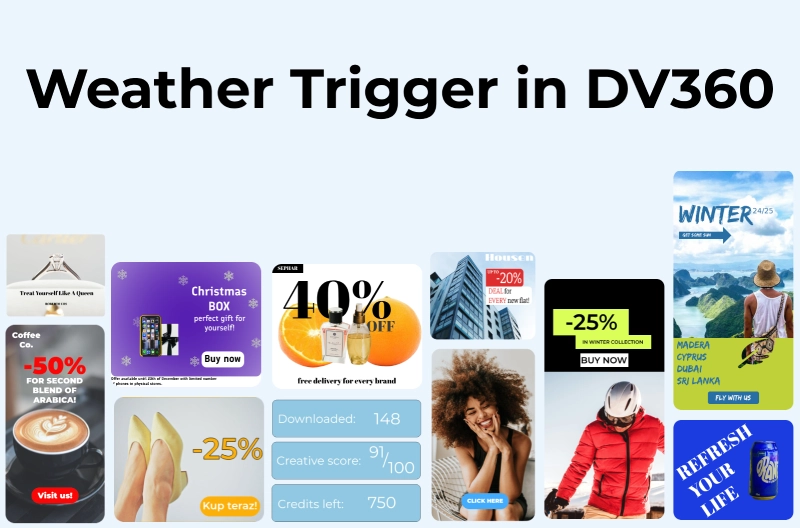June 29, 2024
by Bartosz Salamon
Share
Picture this: it’s a chilly morning, and your potential customers are greeted with ads for cozy sweaters and hot beverages just when they need them most. Weather based advertising allows you to connect with your audience in a meaningful way by aligning your marketing messages with the weather conditions they are experiencing. By leveraging close to real-time weather data, you can make your ads more relevant, engaging, and timely. In this guide, we’ll walk you through the essentials of weather based advertising, its benefits, and how AdsLinkers can help you seamlessly integrate this strategy into your campaigns.

Weather Based Advertising Overview
Weather based advertising uses close to real-time weather data to tailor marketing messages based on current or forecasted weather conditions. This approach ensures that your advertisements are timely and relevant, increasing the likelihood of capturing your audience’s attention. The types of weather data used in these campaigns can include temperature, precipitation, humidity, UV index, rain and weather forecasts. For example, a sunscreen ad might be triggered by sunny weather, while an ad for heating systems might appear during colder temperatures.
Benefits of Weather Based Advertising
Implementing weather based advertising in your marketing strategy offers several significant benefits such as:
Increased Relevance
Weather based ads are inherently more relevant because they respond to the immediate needs and preferences of consumers based on the current weather conditions. This relevance translates to higher engagement rates as consumers are more likely to interact with ads that reflect their current environment.
High Engagement
Ads that are aligned with the weather are more engaging. For instance, an ad for hot beverages on a cold day or cooling products on a hot day can see significantly higher click-through rates. This engagement boost can lead to more conversions and a better return on investment.
Budget Savings
Weather based advertising can lead to significant budget savings. By only showing ads when they are relevant to the current weather conditions, you ensure that your marketing budget is spent more efficiently, reducing waste and increasing the overall effectiveness of your campaigns.

Higher ROI/ROAS
By targeting ads based on weather conditions, you can optimize your ad spend and improve your campaign’s ROI/ROAS. Weather based advertising ensures that your marketing budget is spent on highly relevant ads, reducing waste and increasing effectiveness.
How AdsLinkers Uses Weather Based Advertising
AdsLinkers platform leverages close to real-time weather data to transform how advertising campaigns are managed and executed. Here’s how the platform facilitates this innovative marketing approach. We are connected to multiple platforms such as: Google Ads, Display & Video 360, Meta apps (Facebook, Instagram, Messenger, WhatsApp), TikTok.
Close to Real-Time Weather Data Integration
AdsLinkers integrates seamlessly with major weather data providers, ensuring that your advertising campaigns are updated as quickly as possible based on current weather conditions. This integration allows for dynamic adjustments to your ads, ensuring they are always relevant.
Dynamic Campaign Adjustment
With AdsLinkers, you can set specific triggers based on weather conditions. The platform allows for granular control, enabling you to adjust specific line items, ads, and even bids. You can also use logical operators like “and” or “or,” and mix weather triggers with other data points to create highly personalized and effective marketing strategies.
Step-by-Step Setup of Weather Based Advertising Workflow
Connect Your Account: Begin by connecting your advertising account to AdsLinkers. This process involves granting access to individual advertisers, ensuring that AdsLinkers can manage existing campaigns across various platforms.
Select Type of Workflow: Choose the type of workflow that best suits your marketing needs. AdsLinkers offers a variety of workflow templates designed to optimize different aspects of campaign management, such as real-time bidding adjustments and content delivery based on weather conditions. You can choose 1-way, 2-way or All-time.
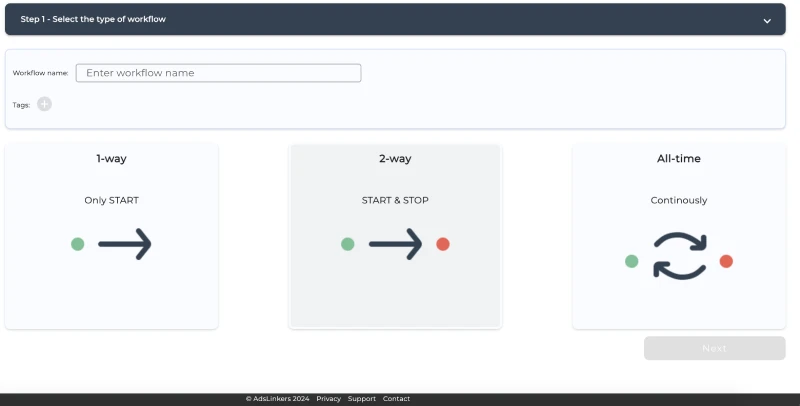
Define Your Workflow Settings: Configure your workflow by setting triggers, actions, and delays according to specific campaign needs. For weather based advertising, you might set a trigger based on temperature changes, precipitation levels, or weather forecasts. Define actions such as launching a corresponding digital ad or adjusting bids in close to real-time.
Incorporate Additional Data: Besides weather data, consider integrating other relevant data points that might impact campaign performance, such as other triggers based on consumer behavior trends or geographic location.
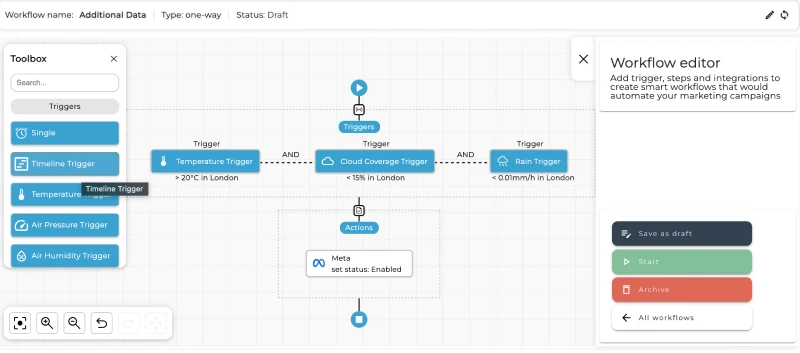
Double Check and Start: Before activating your workflow, review all settings for accuracy and completeness. Ensure that all parameters are correctly set and that the workflow aligns with your overall marketing objectives. Once everything is in place, launch the workflow to start automating your campaigns based on close to real-time weather data and predefined conditions.
How to Evaluate Weather Based Advertising Campaigns
Evaluating the success of weather based advertising campaigns requires a thorough understanding of both performance metrics and awareness metrics. Here’s a breakdown of the key metrics to monitor.
- Cost Per Acquisition (CPA): This measures the total cost of acquiring a new customer. It’s crucial for determining the financial effectiveness of your advertising actions.
- Cost Per Click (CPC): CPC is vital for assessing the cost-effectiveness of your digital advertising campaigns. It indicates the cost incurred for each click on an ad.
- Cost Per Lead (CPL): This metric is especially important for campaigns aiming to generate leads. It provides insights into the cost associated with each potential customer lead obtained through the campaign.
- Cost Per Mille (CPM): This measures the cost per thousand impressions, providing insight into the cost efficiency of reaching a wide audience.
- Cost Per View (CPV): Used primarily in video advertising, CPV helps advertisers understand the cost involved in each view of their video ads.
- Brand Lift: This metric involves measuring the direct impact of an ad campaign on consumer perception and awareness of the brand. Brand lift studies often look at metrics like brand awareness, ad recall, and consideration.
Monitoring these metrics allows marketers to assess the direct and indirect impacts of their advertising campaigns. In the case of weather based advertising, it’s essential to see how changes in weather conditions influence these metrics, offering insights into when and how to tweak campaign parameters for maximum effectiveness.
Case studies on weather based advertising
Financial Institution
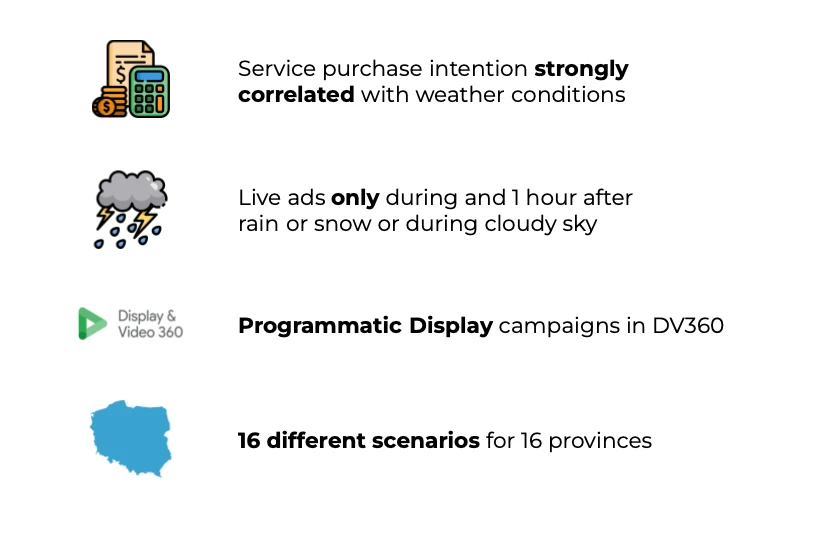
Clothing retailer
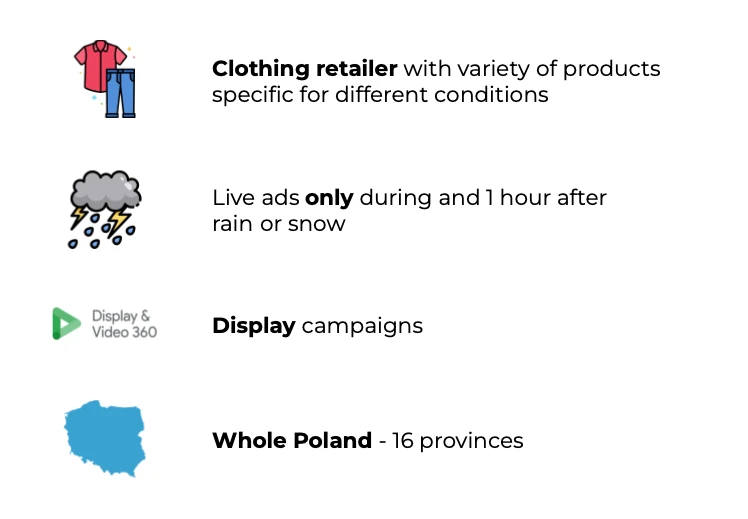
Future Trends in Weather Based Advertising
Contextual targeting involves delivering ads based on the content that a user is currently viewing, rather than relying on cookies or personal data. This method, combined with weather data, allows for highly relevant and non-intrusive advertising.
With increasing privacy concerns and regulations, cookieless targeting is becoming more important. Weather based advertising can leverage environmental data to deliver personalized ads without relying on cookies, ensuring compliance with privacy standards.
Digital out-of-home advertising involves displaying digital ads in public spaces, such as billboards and transit shelters. By integrating weather data, DOOH ads can be dynamically adjusted to reflect current weather conditions, making them more relevant and engaging.
Let’s work together!
Are you ready to transform your digital advertising strategy with the power of close to real-time weather data? Contact AdsLinkers today to learn how our advanced platform can tailor your marketing efforts to dynamically match weather conditions, enhancing engagement and maximizing your return on investment. Don’t miss out on the opportunity to make your advertising more relevant, responsive, and effective. Schedule a call with us now and see the difference firsthand!




